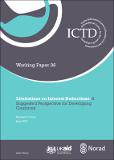| dc.contributor.author | Durst, Michael C. | |
| dc.date.accessioned | 2016-04-11T14:22:24Z | |
| dc.date.available | 2016-04-11T14:22:24Z | |
| dc.date.issued | 2015-06 | |
| dc.identifier.citation | Durst, M.C. (2015) Limitations on Interest Deductions: A Suggested Perspective for Developing Countries. ICTD Working Paper 36. Brighton: IDS. | en |
| dc.identifier.isbn | 978-1-78118-239-0 | |
| dc.identifier.uri | https://opendocs.ids.ac.uk/opendocs/handle/20.500.12413/11196 | |
| dc.description | interest deductions; related-party loans; OECD; base erosion and profit shifting; BEPS; transfer pricing. | en |
| dc.description.abstract | This paper evaluates the efforts of the Organisation for Economic Co-operation and Development (OECD), in its project on base erosion and profit shifting (BEPS), to control profit shifting by members of multinational groups through payments of interest on related-party loans. Currently, members of groups appear be shifting large amounts of income from countries around the world to affiliates in zero- or low-tax countries, through the relatively simple expedient of creating loans between identically-owned group members. The resulting revenue losses are especially serious for developing countries, which depend more heavily than other countries on revenue from corporate income taxation; in addition, it appears that groups investing in developing countries sometimes employ tax planning through related-party loans very aggressively.
The paper evaluates the OECD’s proposal for a ‘group-wide’ limitation on interest deductions, under which only loans obtained by group members from unrelated parties would generate deductible interest payments, and the resulting deductions would be apportioned among group members based on measures of their relative levels of economic activity. The paper agrees with the OECD’s conclusion that the group-wide approach should be more difficult to avoid than existing kinds of interest-limitation regimes, including ‘thin capitalisation’ regimes based on debt-to-equity ratios, and limitations on deductions based on percentages of companies’ earnings before interest, tax, depreciation and amortisation (EBITDA).
The paper nevertheless concludes that the suggested approach remains vulnerable to very difficult and perhaps intractable problems of identifying ‘interest’ in today’s highly complex international environment. Therefore it will be very difficult at best for revenue agencies to administer successfully, even if the OECD’s approach proves politically feasible. The paper recommends instead that countries devise means of incorporating the control of interest deductions into their generally applicable transfer pricing rules. Under this approach, excessive deductions of all kinds could simultaneously be limited to reasonable amounts. The paper suggests a format for a transfer pricing method that might fulfill this need, a Shared Net Margin Method (SNMM).
The paper concludes that if a more comprehensive approach to transfer pricing rules proves politically infeasible, the OECD’s approach to interest deductions would represent a substantial improvement over current forms of interest limitations, and countries should adopt the OECD approach. For the longer term, however, effective control of interest deductions will probably require a thorough revision of transfer pricing rules, perhaps along the lines of SNMM. | en |
| dc.description.sponsorship | DfID, NORAD. | en |
| dc.language.iso | en | en |
| dc.publisher | Institute of Development Studies | en |
| dc.relation.ispartofseries | ICTD Working Paper;36 | |
| dc.rights | Limitations on Interest Deductions: A Suggested Perspective for Developing Countries
Michael C. Durst
ICTD Working Paper 36
First published by the Institute of Development Studies in June 2015
© Michael C. Durst 2015
ISBN: 978-1-78118-239-0
The author of this paper grants to the IDS and the ICTD a perpetual, irrevocable, worldwide, royalty-free, non-exclusive licence, or sublicence, to reproduce, communicate to the public, use, adapt, publish, distribute, display and transmit the work in any and all media, and to sublicense others (including the Crown) to reproduce, communicate to the public, use, adapt, publish, distribute, display and transmit the work in any and all media, for non-commercial purposes and with appropriate credit being given to the author and ICTD funders.
A catalogue record for this publication is available from the British Library.
This work has been licensed by the copyright holder for distribution in electronic format via any medium for the lifetime of the OpenDocs repository for the purpose of free access without charge and can be found at http://opendocs.ids.ac.uk/opendocs/
Also available from:
The International Centre for Tax and Development
at the Institute of Development Studies, Brighton BN1 9RE, UK
Tel: +44 (0) 1273 606261 Fax: +44 (0) 1273 621202
E-mail: info@ictd.ac.uk
Web: www.ictd/en/publications
IDS is a charitable company limited by guarantee and registered in England (No. 877338) | en |
| dc.rights.uri | http://www.ids.ac.uk/files/dmfile/IDSOpenDocsStandardTermsOfUse.pdf | en |
| dc.subject | Economic Development | en |
| dc.title | Limitations on Interest Deductions: A Suggested Perspective for Developing Countries | en |
| dc.type | IDS Working Paper | en |
| dc.rights.holder | © Michael C. Durst | en |
| dc.identifier.externaluri | http://www.ictd.ac/publication/2-working-papers/29-limitations-on-interest-deductions-a-suggested-perspective-for-developing-countries | en |

